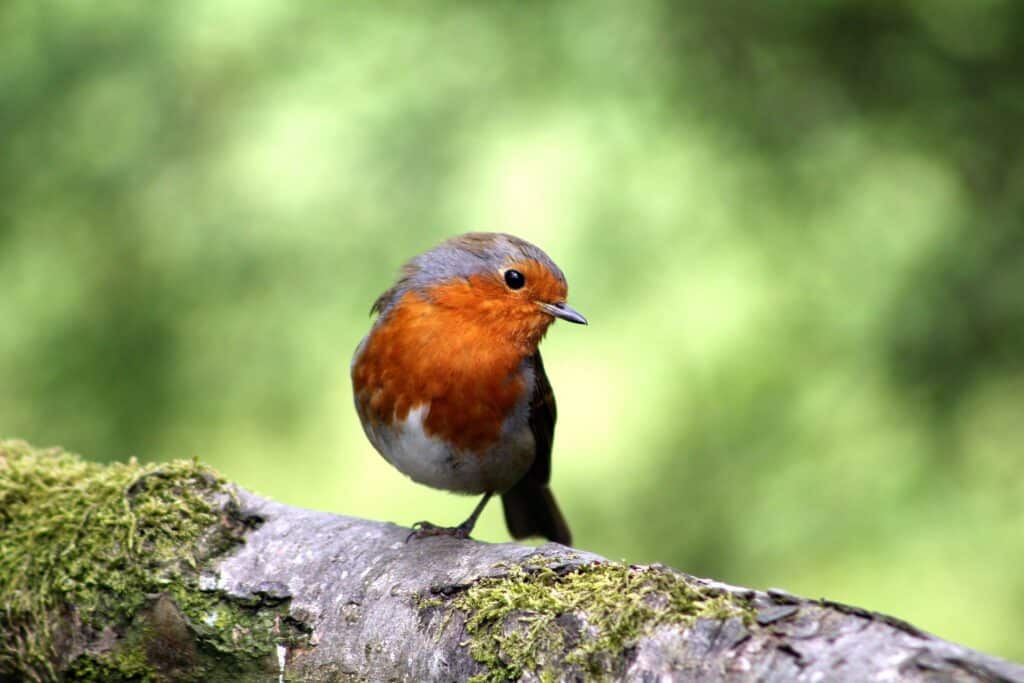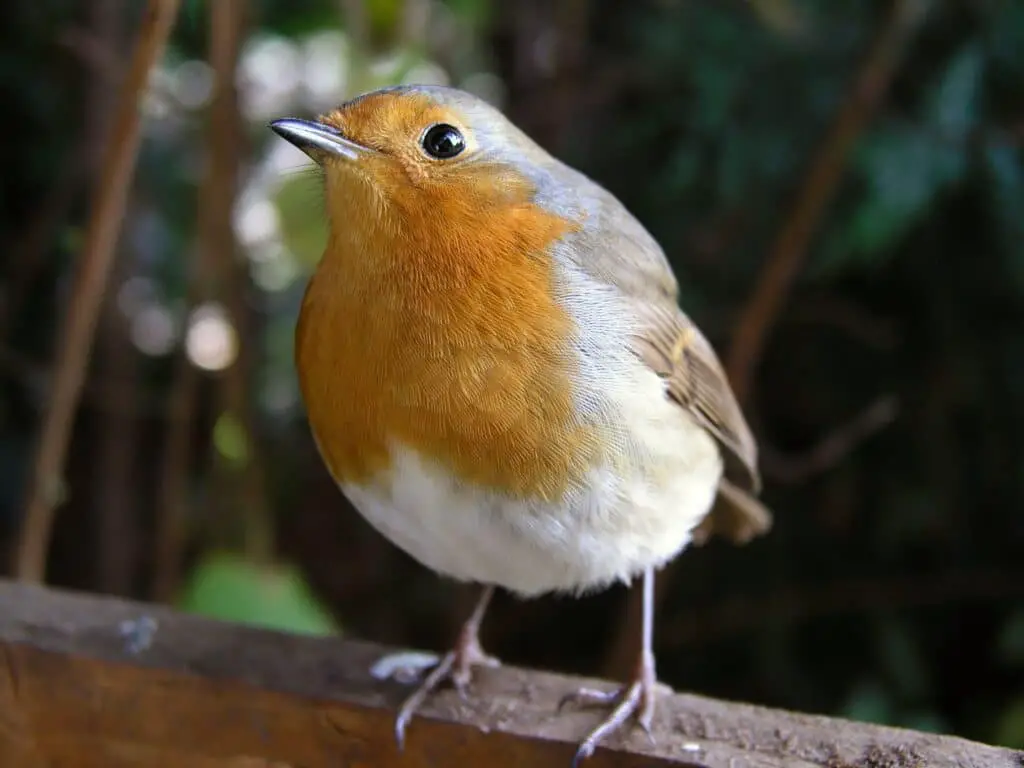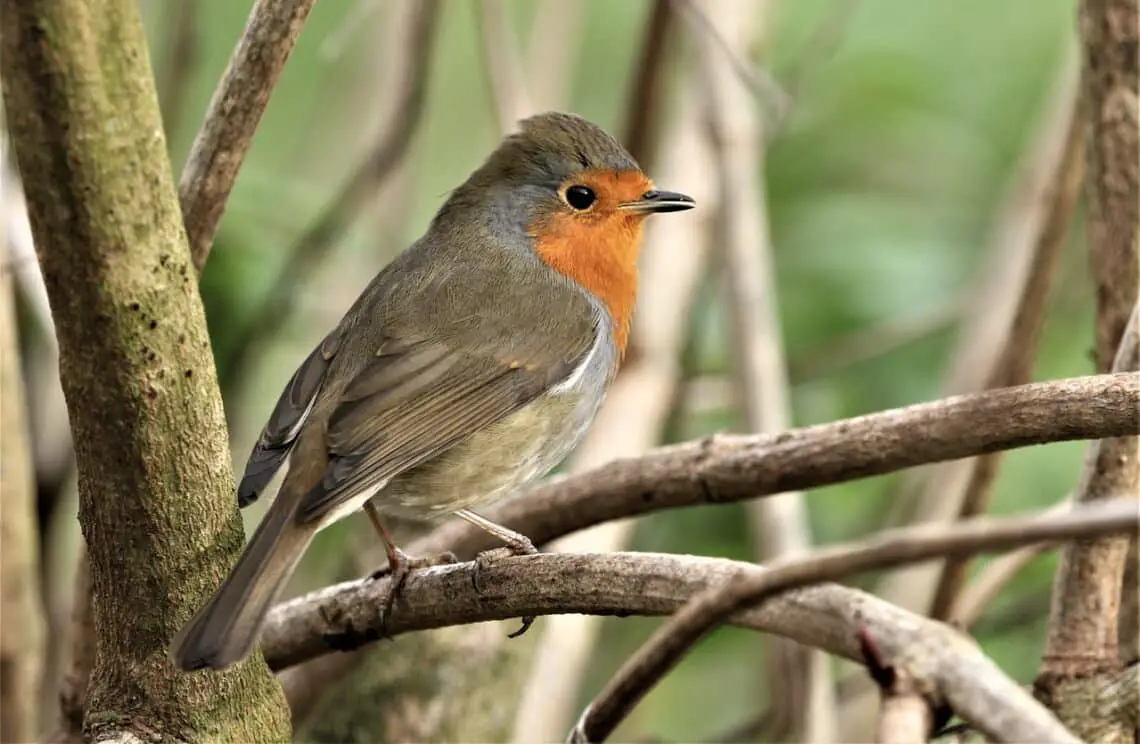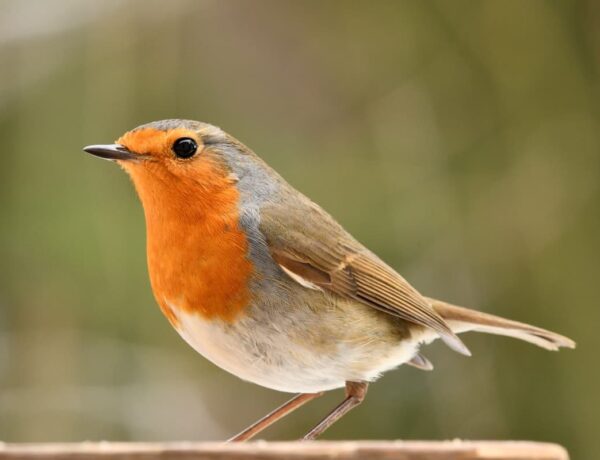Introduction
Are Robins Territorial: Robins, with their striking red breasts and melodious songs, are among the most beloved and iconic birds in many parts of the world. These avian creatures have long captured the imagination of birdwatchers and nature enthusiasts alike. One question that often arises when observing robins in the wild is whether they are territorial creatures. In the fascinating behavior of robins migrate, seeking to unravel the mystery of their territorial tendencies. Robins, scientifically known as Turdus are native to North America and are well-known for their distinctive red or orange breasts, which stand out vividly against their otherwise grayish-brown plumage. They are a familiar sight in gardens, parks, and woodlands across the continent, and their cheerful song is often associated with the arrival of spring.
But beneath their charming appearance lies a complex world of behavior and interaction. Territoriality is a common phenomenon in the animal kingdom, where individuals or groups of animals defend specific areas for various reasons, including access to resources, breeding, and raising offspring. In robins, their territorial behavior becomes particularly evident during the breeding season. These birds are known to establish and vigorously defend territories, with males taking the lead in this endeavor. As the days grow longer and the temperatures rise, robins embark on their annual journey to find suitable nesting sites. They are highly selective in choosing locations that offer an abundance of food and a safe haven for their offspring.
Once a suitable spot is identified, the male robin becomes the guardian of this territory, marking it with passionate song and aggressive displays. This territorial defense serves two primary purposes to attract a mate and to discourage rival males from encroaching on their chosen territory. Throughout this exploration, we will examine the intricacies of robin territoriality, from the selection of nesting sites to the fascinating courtship rituals and the fierce defense of their chosen domains. We will also consider the ecological significance of their behavior and the implications for other bird species that share their habitats. I hope to gain a deeper understanding of these captivating birds and the role territoriality plays in their lives.

Are robins territorial to humans?
Robins are aggressively territorial and will drive intruders away, mainly with vocal threats made by both male and female, both sexes singing the same “threatening” songs!
Robins are indeed territorial birds, but their territoriality is primarily directed towards conspecifics, meaning they are most territorial when it comes to other robins. During the breeding season, which typically spans from early spring to early summer, male robins are known to establish and vigorously defend territories. These territories are chosen based on the availability of suitable nesting sites and an abundance of food, which are essential for attracting mates and raising offspring.
The territorial behavior of robins towards other robins is characterized by song and displays, which serve to communicate boundaries and deter rival males from encroaching. While this territoriality can sometimes lead to aggressive interactions between competing males, it is a crucial part of the breeding process for robins.
However, when it comes to humans, robins generally do not exhibit the same territorial behavior. Unlike some bird species that might become aggressive towards humans if they perceive them as threats to their nests or young, robins tend to be more tolerant. They often nest in close proximity to human activity, taking advantage of the relative safety and abundant food sources found in gardens and urban areas.
Robins may even become accustomed to the presence of humans and may not react aggressively if people approach their nesting sites, though they may monitor the situation closely. In fact, many people have had the delightful experience of observing robins building nests and raising their young in close proximity to their homes.
Do robins get aggressive?
Its public image is one of a tame, friendly bird, when in reality, it is one of the most aggressive birds you could meet! If you’re another robin that is. Robins are fiercely territorial throughout the year and will not tolerate another robin entering their patch of turf. And it’s not just the males.
Territorial Aggression: During the breeding season, which typically spans from early spring to early summer, male robins are known to become territorial. They establish territories primarily to attract mates and secure suitable nesting sites. While this territoriality is directed mainly at other robins, it can sometimes manifest as aggression. Male robins may engage in territorial disputes, which can involve chasing and physical confrontations with rival males. However, this aggression is typically limited to interactions between male robins and is not directed towards other species, including humans.
Protection of Nests and Young: Robins are diligent parents, and once they have established a nest and laid eggs, they become protective of their territory. If they perceive a threat to their nest or young, they may exhibit defensive behavior. This can include vocalizing loudly to deter potential threats, such as other birds or animals, from approaching the nest. While this behavior is not aggressive towards humans, it is a way for robins to ensure the safety of their offspring.
Close Nesting Proximity: Robins often choose to build their nests in close proximity to human activity, such as gardens, parks, and even on buildings. They do so because these areas a relatively safe environment with ample food sources. In such cases, robins may become accustomed to the presence of humans and are less likely to display aggression. Instead, they often go about their daily activities, including feeding and caring for their young, without reacting aggressively to human observers.
Why are robins aggressive territorial?
A male will seek to stake out enough territory to provide food for it, a female and their young. Robins are one of only a few bird species that hold their territory all year round – males do not migrate in the winter.
Resource Competition: One of the primary reasons for robin territoriality is competition for essential resources, particularly during the breeding season. Robins are omnivorous and rely on a diverse diet, including insects, worms, fruits, and berries. To ensure an ample food supply for themselves and their offspring, they establish territories with access to these resources. Aggressive territorial behavior helps them fend off other robins that might compete for the same food sources.
Mate Attraction: Male robins are particularly aggressive and territorial during the breeding season because they are in competition with other males for mates. A well-defined territory with abundant resources, such as food and suitable nesting sites, is attractive to females. Males use territorial displays, songs, and sometimes physical confrontations to establish their dominance and attract potential mates.
Nest Protection: Once a female robin selects a mate and lays eggs, both parents become fiercely protective of their nesting territory. Aggression towards other robins and potential nest predators is a way to safeguard their nest and the vulnerable nestlings. This protective behavior helps increase the chances of their offspring surviving to maturity.
Do robins fight for territory?
Many robin fights take place as winter flocks break up before spring nesting season, or when robins arrive someplace and want to establish a territory. The first robins to return and set up territory boundaries are often the ones that had that territory last summer.
Breeding Season Territoriality: The primary reason robins engage in territorial disputes is linked to the breeding season, which typically occurs from early spring to early summer. During this period, male robins become especially territorial as they seek to attract mates and secure suitable nesting sites. To maximize their reproductive success, they vigorously defend territories that offer an abundance of food, safety, and attractive nesting locations.
Establishing Boundaries: Territorial fights among robins help establish clear boundaries between neighboring territories. These boundaries are typically defined by physical landmarks such as trees, shrubs, or other prominent features in the landscape. When a robin defends its territory, it often engages in aggressive behavior to signal to rival males that they have crossed into its domain.
Vocal and Physical Displays: Territorial disputes between robins can involve vocalizations, such as loud and repetitive songs, to communicate dominance and assert ownership of the territory. These songs are accompanied by physical displays, which may include raised feathers, fluffed plumage, and beak snapping. In physical confrontations, such as chasing and pecking, can occur if two males cannot resolve their territorial dispute through vocalizations and displays alone.
Why are robins so friendly?
As a gardener digs over the soil, robins stand by expectantly, hopping back and forth in between sitting and watching, their sparkly eyes looking for juicy worms to be uncovered. This helps to answer the age-old question: ‘why are robins so friendly? ‘ Well, there might just be some tasty morsels in it for them!
Proximity to Human Habitats: Robins are highly adaptable birds that have successfully established themselves in a variety of environments, including urban and suburban areas. They often build their nests in close proximity to human activity, such as gardens, parks, and residential neighborhoods. This frequent coexistence with humans can lead to familiarity and tolerance.
Food Availability: Robins are omnivorous and have a diverse diet that includes insects, worms, fruits, and berries. Human-inhabited areas often a consistent and readily available source of food, such as earthworms in well-maintained gardens. Robins may become accustomed to foraging in these areas, which can make them more tolerant of human presence.
Lack of Predatory Threat: Unlike some larger birds of prey or carnivorous mammals, robins do not pose a physical threat to humans. Their small size and diet primarily consisting of insects and worms mean they are not seen as potential predators by humans, which can contribute to the perception of friendliness.
Are robins friendly to humans?
Birds such as magpies, crows and mockingbirds can also identify people. However, robins being friendly and a little curious means they pay very close attention to the humans in their neighbourhood.
Proximity to Human Habitats: Robins are highly adaptable birds that have successfully adapted to a variety of environments, including urban and suburban areas. They are commonly found in gardens, parks, and residential neighborhoods, often building their nests in close proximity to human activity. This frequent coexistence with humans can lead to familiarity and tolerance.
Tolerance of Human Presence: Robins often display a remarkable tolerance of human presence. They may go about their daily activities, such as foraging for insects and worms or caring for their young, even when humans are nearby. This behavior suggests a level of comfort with human observers.
Insectivorous Diet: Robins are insectivorous birds, and their diet includes a variety of insects and worms. Many people maintain gardens that attract insects, making their yards a reliable source of food for robins. This availability of food can lead robins to associate human-inhabited areas with a reliable food source.
Lack of Aggression: Robins are not known for aggressive behavior towards humans. While they can exhibit territorial behavior during the breeding season, this aggression is typically directed towards other robins or potential nest predators. They do not generally pose a threat to humans and rarely display hostile behavior unless they perceive a direct threat to their nests or young.
Are robins a smart bird?
How smart are robins? A. Robins are not quick to learn new things as blue jays, and do not have as good reasoning power as jays. But they are adaptable, and can quickly figure out how to find food and shelter in a new area where they’ve never been before.
Nest Building: Robins are skilled nest builders. They construct cup-shaped nests using a variety of materials, including twigs, grass, and mud. The construction process involves careful selection and placement of materials to create a stable and secure nesting structure. Robins’ ability to build nests that protect their eggs and nestlings from the elements showcases their architectural intelligence.
Foraging Skills: Robins are adept foragers with a diverse diet that includes insects, worms, fruits, and berries. They employ various hunting techniques, such as using their keen eyesight to spot prey on the ground and then pouncing on it. Their ability to locate and capture moving prey requires problem-solving and coordination skills.
Memory and Navigation: Robins are known for their remarkable navigational abilities, particularly during migration. They can travel thousands of miles to their wintering grounds and return to the same breeding territory in subsequent years. This ability suggests a capacity for memory and spatial awareness.
Territorial Behavior: During the breeding season, robins establish and defend territories. Their territorial behavior involves recognizing boundaries and communicating with songs and displays. Robins must the locations of their territories and engage in social interactions that require cognitive recognition and decision-making.
Do robin birds have feelings?
Birds Do Have Brains
And they are exceptionally intelligent creatures when it comes to socialization. In fact, it’s the complex responses seen from bird socialization that leads scientists to believe they experience emotions at least to some degree.
Parental Care and Bonding: Robins, like many bird species, engage in extensive parental care. Both male and female robins invest significant time and effort in incubating eggs, feeding nestlings, and protecting their young. The intensity of their care suggests a strong attachment to their offspring, akin to parental love in mammals. While it may not be the same as human emotions, it underscores the importance of the parent-offspring bond.
Territorial Behavior: Robins display territorial behavior, especially during the breeding season. They defend their territories vigorously, sometimes engaging in confrontations with rival robins. This territoriality may reflect a form of territorial pride or emotional attachment to their chosen nesting area.
Songs and Vocalizations: Robins are known for their melodious songs, which they use for communication. They sing to attract mates, define territories, and communicate with other robins. The complexity and variability of their songs suggest a form of emotional expression, perhaps related to courtship or social bonding.
Stress and Fear Responses: Research has shown that birds, including robins, exhibit physiological and behavioral responses to stress and fear. These responses can include increased heart rate, changes in hormone levels, and avoidance behaviors. Such reactions suggest that birds may experience emotions related to fear or stress in response to perceived threats.

Conclusion
Robins are territorial and have been answered with a resounding “yes.” These iconic birds are indeed territorial, and their territorial behavior is a fascinating aspect of their lives, especially during the breeding season. Throughout this exploration, we have gained insights into the various facets of robin territoriality and its significance in the avian world. One of the key takeaways from our investigation is that robins’ territorial behavior is intimately tied to their survival and reproductive success. By defending a well-chosen territory, male robins not only attract potential mates but also ensure access to essential resources like food and shelter.
This territoriality is a testament to the evolutionary adaptability of these birds, allowing them to thrive in diverse habitats across North America. The captivating courtship rituals of robins, where males employ a combination of song, displays, and territorial defense to woo potential mates. These rituals showcase the intricate interplay between behavior and biology, highlighting the lengths to which robins go to ensure the continuation of their species. The ecological significance of robin territoriality cannot be overstated. By creating and maintaining territories, robins influence the distribution and abundance of other bird species in their habitat.
Their presence can shape local ecosystems and impact the dynamics of bird communities, showcasing the ripple effect of their territorial behavior. Robins hold a special place in the hearts of many as symbols of spring and renewal. Their robins cheerful songs and vibrant plumage are a source of joy and inspiration for birdwatchers and nature enthusiasts. Understanding their territorial tendencies adds another layer of appreciation for these remarkable creatures and the role they play in the natural world. In closing, the territoriality of robins is a testament to the complexity and richness of the avian world. It underscores the intricate connections between behavior, biology, and the environment, revealing the remarkable strategies that birds employ to thrive in their ecosystems.





No Comments